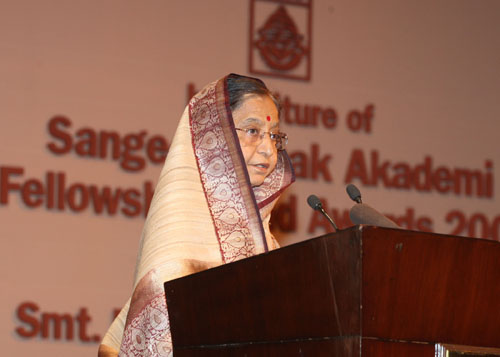
SPEECH BY HER EXCELLENCY THE PRESIDENT OF INDIA, SHRIMATI PRATIBHA DEVISINGH PATIL DURING THE PRESENTATION OF THE SANGEET NATAK AKADEMI FELLOWSHIPS (AKADEMI RATNA) AND THE AKADEMI AWARDS - 2009
New Delhi, 28th September 2010

Ladies and Gentlemen,
I am very happy to be present at the award ceremony of Sangeet Natak Akademi. I would like to congratulate Shri Lalgudi Jayaraman - Carnatic Violinist, Shri Shreeram Lagoo - Theatre Actor, Ms. Yamini Krishnamurti - Bharatanatyam exponent, Shri Kamlesh Dutt Tripathi - Scholar of Sanskrit Theatre as well as Smt. Kishori Amonkar and Pandit Jasraj - both Hindustani Vocalists on becoming Fellows of the Akademi. All of you have achieved excellence, are eminent persons in your respective fields and have rendered yeomen service to Indian art and culture. I also congratulate the Sangeet Natak Akademi awardees. You too have contributed immensely and deserve recognition.
Culture is a source of pride for all peoples, nations and societies. This award ceremony is a time to recall our own highly evolved and rich culture. Dances with their rhythms and expressions, music with its different gharanas, folk performances with their multiplicity of local themes and local dresses bring to mind a powerful idea of India and its civilization. Art and culture, music and literature not only give an identity to a country, but also become the means to celebrate life itself. Dance and music in India have closely been associated with the change of seasons, cycle of agriculture, ceremonies of birth and marriage.
Material prosperity through the application of science and technology is no doubt essential for any modern community. But economic progress by itself in a cultural vacuum would be soulless. A nation needs the moorings of a set of values and cultural expressions, which provide it the intellectual and spiritual compass for its growth. Rejuvenation of arts has been an inevitable accompaniment of our national growth. Hence, even as we are progressing, we must continue to have an environment where excellence in art and culture can be achieved. Fine arts sharpen our sensibilities as human beings and make life worth living. Society, therefore, has a great stake in the artistic genius of gifted individuals and they must receive our encouragement and appreciation.
India is a very large country where the concept of unity through diversity is integral. The music of our saints and sages like Guru Nanak, Tulsidas, Kabir, and Surdas has helped preserve equilibrium in society and righteousness in the individual. By promoting greater understanding, even within the country, of our various cultures, music has became a vital aspect of our national integration as well. Moreover, a society which ennobles arts is enlightened. Hatred and violence can have no place in a civilized society. Here, I would like to recall the words of Mahatma Gandhi - 'Mutual courtesy and respect is the foundation of culture'. These words in essence capture the values and behavioural conduct necessary for civilized societies.
In India, learning has been an age-old concept. Knowledge has been passed on from generation to generation. The Guru-Shishya parampara has a special significance in the field of performing arts. This is because these demand perfection and are the outcome of rigorous training and self-discipline. We have in our country many masters in the field of music, and I am confident that they would pass on their knowledge to their students, so that our rich tradition is kept alive.
Since very early times, Indian culture has had an influence in the world. I was recently in Laos and Cambodia. There are historical and cultural monuments in both these countries that are a glorious testimony to our common cultural heritage. In the language, customs and rituals also there are many commonalities. For example, the Baci ceremony of Laos where threads are tied on the wrists of friends and family for their welfare and security is very much like our festival of Rakshabandhan. I witnessed performances in Cambodia based on the Ramayana. These close cultural linkages with these countries, as also other countries both to the East and West, today provide the basis for our longstanding bonds of friendship with them. Cultural diplomacy is a potent instrument in our foreign policy. Cultural exchanges, I believe, are important to promote understanding between peoples and must be encouraged.
In today's globalised and integrated world, there are cross-cultural currents and, at the same time, advances in technology are providing newer variants of art and music. In these circumstances, questions of how to absorb change and how to retain the traditional styles present a challenge. I believe it is important for the many strands of culture that exists in the world and are a result of the evolution of different civilizations, to continue to exist. These add to variety in the world which is so essential for keeping it as a planet of great cultural diversity, which alone can make it interesting. However, there should be efforts to take these different cultural forms to the people in an appealing manner.
India has a rich cultural canvas, which forms an important part of the global cultural heritage. It needs to be preserved, conserved and documented. New technologies offer us an opportunity for this. Creating archives of performing arts would also help academic institutions who could use these materials for educational purposes, researchers in their work and practitioners in their art. Speaking at the Sangeet Natak Akademi's previous functions, I have spoken of it and, I repeat here, the need for society at large to become patrons of art and culture. Business houses and the corporate world must lend their support to this cause.
The Sangeet Natak Akademi is the principal all-India organization responsible for the encouragement and development of dance, drama and music. I am confident that under the guidance of Ms. Leela Samson its new Chairperson, the Akademi will continue to play a leading role in nurturing our cultural richness.
Thank you.
Jai Hind.
|

